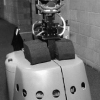Free Online Productivity Tools
i2Speak
i2Symbol
i2OCR
iTex2Img
iWeb2Print
iWeb2Shot
i2Type
iPdf2Split
iPdf2Merge
i2Bopomofo
i2Arabic
i2Style
i2Image
i2PDF
iLatex2Rtf
Sci2ools
127
click to vote
CVPR
1999
IEEE
1999
IEEE
Using the Condensation Algorithm for Robust, Vision-based Mobile Robot Localization
To navigate reliably in indoor environments, a mobile robot must know where it is. This includes both the ability of globally localizing the robot from scratch, as well as tracking the robot's position once its location is known. Vision has long been advertised as providing a solution to these problems, but we still lack efficient solutions in unmodified environments. Many existing approaches require modification of the environment to function properly, and those that work within unmodified environments seldomly address the problem of global localization. In this paper we present a novel, vision-based localization method based on the CONDENSATION algorithm [17, 18], a Bayesian filtering method that uses a samplingbased density representation. We show how the CONDENSATION algorithm can be used in a novel way to track the positionof the camera platform rather than tracking an object in the scene. In addition,it can also be used to globally localize the camera platform, given a visu...
Computer Vision | CONDENSATION Algorithm | CVPR 1999 | Global Localization | Unmodified Environments | Vision-based Localization Method | Visionbased Robot Localizationmethod |
Related Content
| Added | 12 Oct 2009 |
| Updated | 30 Oct 2009 |
| Type | Conference |
| Year | 1999 |
| Where | CVPR |
| Authors | Frank Dellaert, Wolfram Burgard, Dieter Fox, Sebastian Thrun |
Comments (0)

